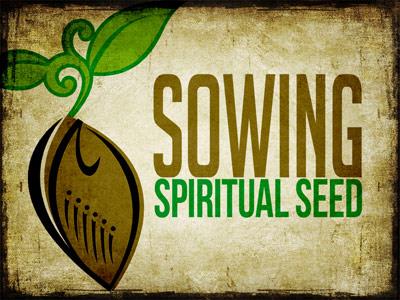-
The Seed
Contributed by Jason Martin on Jan 8, 2025 (message contributor)
Summary: The imagery of a seed in Amos 9:13-15 teaches us about God's promises for growth, renewal, and abundance. A seed is small but powerful, holding within it the potential for transformation.
Preached Jan 5, 2025
If you need the Powerpoint. send an email to bishop@lfccog.ca
Text: Amos 9:13-15
Theme: The Seed – Potential, Preparation, and Expectation
Introduction
The imagery of a seed in Amos 9:13-15 teaches us about God's promises for growth, renewal, and abundance. A seed is small but powerful, holding within it the potential for transformation. For Christians, this transformation mirrors our journey of faith—beginning with a seed and culminating in a divine harvest. Today, we’ll explore the potential, preparation, and expectation of the seed and how these principles apply to our spiritual lives.
============================================
1. Potential: The Promise Within the Seed
Phrases:
• 1. “Every seed carries a future harvest.”
• 2. “Small beginnings, big possibilities.”
Amos 9:13 describes a supernatural abundance where 'the plowman overtakes the reaper.' This reflects God’s ability to turn even the smallest seeds of faith into extraordinary harvests. For Israel, it was a promise of restoration after exile—a reminder of God’s power to transform desolation into fruitfulness.
Farming Analogy: The Potential the Farmer Sees
A farmer sees potential in every seed. To the untrained eye, a seed looks insignificant, but to the farmer, it represents a field of wheat, a vineyard of grapes, or an orchard of apples. The farmer envisions the eventual harvest long before it comes to pass.
Christian Application:
As Christians, our “seeds” include faith, love, service, generosity, and prayer. Each act of faith has incredible potential:
• • Faith can move mountains (Matthew 17:20).
• • Love can transform relationships (1 Corinthians 13:13).
• • Generosity can expand God’s kingdom (2 Corinthians 9:6-7).
• • Prayer can change circumstances and align us with God’s will (James 5:16).
============================================
2. Preparation: Cultivating the Ground
Phrases:
• 1. “Hard hearts don’t grow holy harvests.” - By Jason Martin
• 2. “Preparation determines the promise.” - By Jason Martin
Before any seed can grow, the ground must be prepared. Amos 9:14 speaks of rebuilding and planting—efforts that require intentional labor and removal of obstacles. Without preparation, even the best seeds cannot flourish.
Farming Analogy: Breaking the Ground
Farmers break up hard, unyielding soil to create a fertile environment for seeds. This process involves plowing, removing rocks, and enriching the soil. Without this preparation, seeds cannot take root.
Christian Application:
In our spiritual lives, breaking up the ground means removing pride, sin, and distractions. Pride and distractions manifest as misplaced priorities, unhealthy relationships, or reliance on self rather than God. Preparation requires:
• • Repentance (Hosea 10:12).
• • Seeking God’s guidance through prayer (Philippians 4:6-7).
• • Aligning our lives with His Word (Psalm 119:105).
====================================================
3. Expectation: Anticipating the Harvest
Phrases:
• 1. “Faith waits for the rain.” by Jason Martin
• 2. “Every seed has a season.” by Jason Martin
Amos 9:15 promises that God’s people will be planted in their land, never to be uprooted again. This reflects an expectation of permanence and blessing—a harvest secured by God Himself.
Farming Analogy: The Rain
Farmers look for specific types of rain to ensure a successful harvest: early rain for germination, steady rain for growth, and latter rain for ripening. Each type of rain represents a critical phase in the farming process.
Christian Application:
Christians also experience seasons of rain in their spiritual lives:
• • Early rain: Initial blessings that strengthen faith (Joel 2:23).
• • Steady rain: God’s provision during trials, teaching endurance (James 1:2-4).
• • Latter rain: The fulfillment of God’s promises, producing a fruitful harvest (Zechariah 10:1).
Responding to God’s rain involves trusting His timing, remaining faithful in trials, and celebrating His blessings.
========================
Conclusion
The seed holds incredible promise, but it requires preparation and faith to realize its full potential. Let us embrace the lessons of Amos 9:13-15:
• • Potential: Believe in the power of small acts of faith.
• • Preparation: Remove distractions and align with God’s will.
• • Expectation: Wait for the rain, knowing every seed has its season.
May we trust God for the harvest and sow seeds of faith, love, and service, knowing He will bring the increase.

 Sermon Central
Sermon Central



